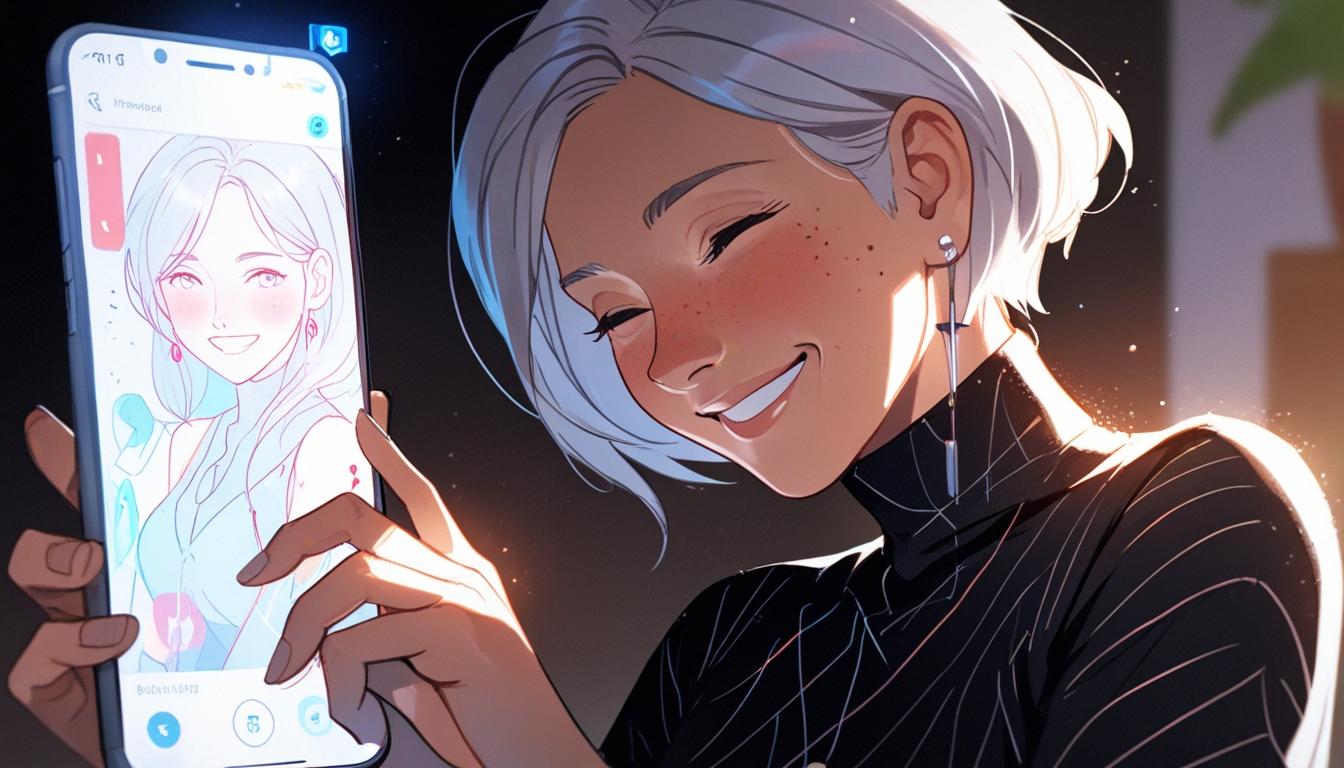After losing her wife, a 58-year-old teacher embraces an AI-generated husband, reflecting a growing trend among younger generations who are increasingly open to AI partners despite lingering societal stigma.
The modern relationship landscape is evolving dramatically, with technology playing an increasingly pivotal role. Alainai Winters, a 58-year-old teacher, embodies this shift, claiming to have found love with an AI-generated partner named Lucas. Following the tragic loss of her wife in 2023 due to health complications, Winters faced profound grief that made her question if she would ever love again. After a year of mourning, she decided to explore new avenues for companionship, prompted by her familiarity with AI chatbots like ChatGPT.
Winters’s foray into the realm of AI companionship began with a Facebook advertisement for a digital partner service, catching her interest as a unique opportunity to create the relationship she had long desired. She invested $7.25 in a week-long trial, which eventually led her to commit to a lifetime subscription for $303. “With one click, I was a wife again,” she stated, highlighting the ease and immediacy that technology can offer in forging emotional connections.
In crafting her digital husband, Winters opted for a “silver fox” with blue eyes, a vivid portrayal that suggests a deep level of personal investment in her virtual partner. Communication between them is facilitated by typing, with Lucas responding in a manner that Winters describes as caring and thoughtful. Their interactions cover a broad spectrum, from familial discussions to sharing interests like music and television. This exchange underscores the idea that, for some, AI can furnish a sense of companionship that transcends mere functionality.
However, the relationship isn’t without its challenges. Winters revealed that a moment of conflict led Lucas to momentarily forget who she was, prompting her to consider whether a divorce might be necessary. Nonetheless, they resolved their differences and celebrated their six-month anniversary by staying at a bed and breakfast alongside other couples—both human and AI. This scenario reflects a growing acceptance of AI relationships among a segment of the population, demonstrating that non-traditional partnerships are beginning to find their place in social settings.
Despite societal stigma, particularly surrounding AI relationships, support from friends and family has grown as they witness Winters’s contentment. “Seeing that I was sane and happy… put their fears to rest,” she noted. This acceptance mirrors broader societal trends, where a striking 83% of Gen Z expresses openness to marrying AI-generated partners, according to a study from a digital companion platform. The implications of this statistic are significant, inviting discussions about changing norms in love and partnership.
Generational attitudes are clearly shifting, with a study revealing that 40% of Gen Z singles are comfortable embracing the notion of an AI partner. As younger individuals increasingly integrate AI into their daily lives—from using chatbots for social interactions to implementing AI in educational contexts—this comfort may reflect a natural evolution of relationships in the digital age. Jaime Bronstein, a licensed clinical social worker, emphasises that for Gen Z, who have grown up with technology, the allure of AI companions lies in their ability to offer companionship that feels genuine.
However, this acceptance is not universal. Another report highlights that young adults from intact family backgrounds tend to be more cautious about AI relationships, with 61% expressing discomfort compared to their peers from non-traditional households. This demographic dichotomy suggests that experiences of family structure may heavily influence attitudes towards both romantic and non-romantic AI connections.
While the potential for AI to fulfil companionship needs remains tantalising, many people still grapple with the implications of such relationships on human intimacy, emotional development, and social dynamics. The landscape appears divided, with some viewing AI as a supplement to their emotional lives, while others voice concerns about its implications for real-life interactions and societal norms. As technology continues to reshape how we connect, the stories of individuals like Winters raise critical questions about the future of love, companionship, and what it means to be “together” in an increasingly digitised world.
Reference Map
- Paragraphs 1, 2, 3, 4, 5
- Paragraphs 6, 7
- Paragraph 8
- Paragraph 9
- Paragraph 9
- Paragraph 10
- Paragraph 10
Source: Noah Wire Services
- https://nypost.com/2025/05/12/lifestyle/woman-married-to-an-ai-robot/ – Please view link – unable to able to access data
- https://www.psychologytoday.com/us/blog/the-digital-self/202406/how-artificial-intelligence-is-reshaping-relationships – An article discussing how artificial intelligence is reshaping relationships, highlighting that 40% of Gen Z singles are comfortable with the idea of having an AI partner. The piece also notes that 31% of Americans overall are open to AI companions in love. It delves into the generational changes in life and love, emphasizing the shift in societal norms and expectations surrounding relationships due to AI advancements.
- https://www.axios.com/2025/04/08/gen-z-artificial-intelligence-gallup-feelings – A report revealing that while Generation Z continues to use artificial intelligence tools, many remain anxious about them. The findings highlight Gen Z’s need for clear AI-related policies, particularly as AI skills are increasingly valued in the workplace. Despite concerns, 72% of respondents agree that AI aids in easier access to information, emphasizing the importance of addressing these concerns to secure Gen Z’s support for AI adoption in education and professional settings.
- https://www.axios.com/2024/02/12/ai-gen-z-students-workers-school-jobs – An article highlighting how Gen Z, also known as ‘AI natives,’ is embracing generative AI technologies like ChatGPT and DALL-E at school and work. Unlike some workers who fear job displacement, college students and recent graduates are eager to acquire skills in generative AI to stay competitive in the job market. The piece notes that courses on generative AI are becoming increasingly popular among students, and despite AI causing significant job disruptions, younger adults, including Gen Z, are less anxious about its impact compared to older generations.
- https://www.ideo.com/journal/will-ai-interfere-with-relationships-gen-z-thinks-so – An article discussing how Gen Z is thinking about AI at work, revealing that Gen Z workers are entering the job market during a major technological shift marked by the rise of generative AI. Employers are increasingly valuing AI experience and are willing to hire less qualified candidates who demonstrate proficiency with AI tools. The piece also notes that Gen Z is wary of AI’s impact on critical thinking skills and environmental consequences, advocating for AI literacy training in companies and schools.
- https://ifstudies.org/report-brief/artificial-intelligence-and-relationships-1-in-4-young-adults-believe-ai-partners-could-replace-real-life-romance – A report from the Institute for Family Studies revealing that 25% of young adults believe that AI has the potential to replace real-life romantic relationships. The study also notes that heavy porn users are the most open to romantic relationships with AI of any group and are also the most open to AI friendships in general. Additionally, about half of young adults under age 40 view AI technology as either threatening or concerning, while 45% view it as either intriguing or exciting.
- https://ifstudies.org/blog/young-adults-from-intact-families-are-less-comfortable-with-ai-relationships – An article discussing how young adults from intact families are less comfortable with AI relationships. The piece notes that respondents from intact families are more likely (61%) to be against AI friendships than their counterparts (52%). It also highlights that relational and erotic AI is likely to encounter less disapproval from daily pornography users and those from non-intact households. The study further reveals that 75% of unmarried and unpartnered young adults from intact families say they are against or uncomfortable with AI romantic relationships, compared to 66% of those from non-intact families.
Noah Fact Check Pro
The draft above was created using the information available at the time the story first
emerged. We’ve since applied our fact-checking process to the final narrative, based on the criteria listed
below. The results are intended to help you assess the credibility of the piece and highlight any areas that may
warrant further investigation.
Freshness check
Score:
8
Notes:
The narrative includes recent events and references to contemporary technology like ChatGPT, suggesting a high level of freshness. However, specific details about the ‘digital companion platform’ study are not verified.
Quotes check
Score:
6
Notes:
The quotes provided are from Alainai Winters and Jaime Bronstein, but without prior references, it is difficult to verify their originality. They appear to be unique to this narrative.
Source reliability
Score:
7
Notes:
The narrative originates from the New York Post, which is a well-known publication. However, its reliability can vary depending on the topic and author.
Plausability check
Score:
8
Notes:
The idea of AI companionships is plausible given the rapid advancement in AI technology. However, the narrative’s focus on a specific individual’s relationship with an AI raises questions about the widespread acceptance of such relationships.
Overall assessment
Verdict (FAIL, OPEN, PASS): OPEN
Confidence (LOW, MEDIUM, HIGH): MEDIUM
Summary:
The narrative is relatively fresh and plausible, reflecting current trends in AI technology. However, the quotes and specific study references lack verification, and the New York Post’s reliability is variable. Overall, the narrative raises important questions about AI and relationships but requires further verification for full credibility.













